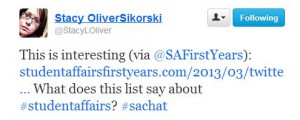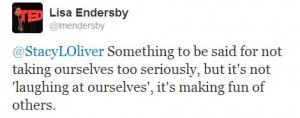Thanks to Stacy Oliver for sharing and sparking some interesting (and very important) conversation yesterday.
After reading the list, I tweeted back:
This “must follow” list includes several accounts meant to walk the line between satire and sarcasm, silly and slander. While I am and always will be an advocate for not taking ourselves too seriously and using humour as a stress buster & community builder, these parody accounts can still rub me the wrong way.
Humour can be a fantastic community builder. Strong ties are formed in crisis, but equally tight bonds are forged in celebration. Laughing together can bring us closer.
But what if you’re not in on the joke? Worse, what if the joke is about you?
Humour can also create vast chasms in relationships, another way to identify the out group that helps us define our in group community (I wrote more about in and out groups as they relate to community building here), while also shaming them for their differences.
Humour, parody, and sarcasm can be great icebreakers, but also fantastically powerful spirit-breakers. We laugh at tweets that identify deficiencies differences or “wrong” ways of thinking, being, and doing in student affairs, walking a fine line between finding the humour in our everyday work and outright shaming others who currently reside in different developmental places.
Where I struggle the most with these parody accounts is how easily they can halt, rather than encourage, meaningful and developmental conversations. Reading someone else make fun of something you identify as something you do or believe in does not automatically prompt deep, reflective introspection – it triggers a need to defend and protect.
How can we possibly expect anyone to be open to learning, development, and growth when they are too busy closing themselves off to protect themselves from shame and ‘making fun’? It’s hard to hear a new point of view when you’re feeling personally confronted, not professionally challenged.
How to we create space where we can be open to “what if” rather than constantly triggering a defense of the “what is”?
Related Posts
When I and While I Next Post:
One Is Not Enough


